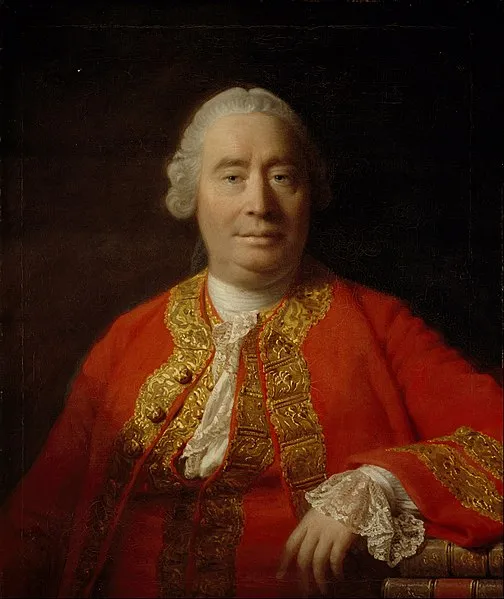
Just what is causation, and how does it work?
In the classical world, causation was thought to be the result of one thing having some sort of causal power or energy. Later, it was thought that causation was a modal notion—A causes B if A necessitates B, for example.
Modality: the classification of logical propositions according to their asserting or denying the possibility, impossibility, contingency, or necessity of their content.
—Merriam-Webster
Then along came Hume (pictured).
Hume was an empiricist, so he was sceptical of these causal notions. We have no way of empirically detecting these modal relations, so what makes us think there’s any such thing going on at all?
What we call causation, figured Hume, is just a set of common temporal relations between certain events. We have come psychologically to think one sort of leads to the other.
Of course, Hume was wrong. If he were right, then night and day match his description of ‘causation.’ Of course, nobody claims night causes day, or the other way around.
As for Hume’s question about the epistemological foundations of causation, Kant responded (rightly, I think) that our knowledge of causation is a priori.
So how can we identify causation?
The Characteristics of Causation
First of all, I’d like to differentiate between direct and indirect causation. Indirect is easy: A is the indirect cause of B if A occurs earlier than B on the same chain of direct causes.
Direct is harder, and is what we’ll be working on.
The most obvious characteristic: A & B must both occur.
I stuck with the old modal idea of necessity:
Event A necessitates event B. That is, it is impossible for A to occur and B not occur.
This alone is not sufficient. For example, consider an event A which necessarily causes two events, B & C. Furthermore, B & C cannot occur independently of A. Thus, there is no case in which B occurs and C doesn’t. So, if we don’t add further conditions, we must say that B causes C, which is not the case.
How about a temporal relationship?
A & B cannot be both simultaneous and instantaneous. If it were so, this would not only not solve our original problem, but all events in history would happen at the same time.
B cannot happen the moment after A. There is no such thing. Consider a number line. Which point is next to 1? 1.1? 1.001? There is no such thing.
The answer is to have A end at the same time B begins. (Or, if A & B occur beyond time, they are both eternal.)
But this still leaves a problem. Suppose A causes B & C, and B causes D. B & C cannot occur unless A occurs, and D cannot occur unless B occurs. Also, B & C take the same length of time. Then, C ends at the same time D begins, so that C fits the qualifications of causing D, even though it didn’t.
Causal Laws
The answer is to change the first condition.
A does not simply cause B, A causes B by a causal law, where a causal law is a modal law in which one thing necessitates another, fitting the time qualifications above. These causal laws may have additional conditions.
So, the conditions we’ve listed are just consequences of these causal laws.
What are the causal laws?
I don’t know. That requires further research.
I can think of one: If God wills some event, that event occurs.
We might return to some classical notion of causal power when it comes to what a mind can cause.
Fundamental physical laws are probably just extensions of some more fundamental metaphysical causal law.
Stated in predicate logic
In an argument, it can be determined if one event causes another using the following as a premise:
∀x∀y[(Nxy & [(Txy → Sxy) v (Bxy → Exy)] & Ox & Oy) → Cxy]
UD: Events.
Nxy: x necessitates y by some causal law.
Txy: x & y occur in time.
Sxy: The end of x is simultaneous with the beginning of y.
Bxy: x & y occur beyond time.
Exy: x & y are eternal.
Ox: x occurs.
Cxy: x is the direct cause of y.
(My knowledge of predicate logic is minimal, so I apologize if I got something wrong.)
Conclusions
This theory is still in its infancy, and much work must be done on it yet.
For example:
- Has anybody already come up with the same theory?
- Are events the things in causal relationships?
- What modal power does a (non-God) mind have?